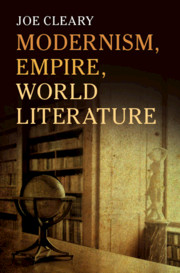Book contents
- Modernism, Empire, World Literature
- Modernism, Empire, World Literature
- Copyright page
- Dedication
- Contents
- Acknowledgements
- Chapter 1 ‘A Language That Was English’: Peripheral Modernisms and the Remaking of the Republic of Letters in the Age of Empire
- Chapter 2 ‘It Uccedes Lundun’: Logics of Literary Decline and ‘Renaissance’ from Tocqueville and Arnold to Yeats and Pound
- Chapter 3 ‘The Insolence of Empire’: The Fall of the House of Europe and Emerging American Ascendancy in The Golden Bowl and The Waste Land
- Chapter 4 Contesting Wills: National Mimetic Rivalries, World War and World Literature in Ulysses
- Chapter 5 ‘That Huge Incoherent Failure of a House’: American Ascendancy and American Epic in The Great Gatsby and Long Day’s Journey into Night
- Chapter 6 ‘A Wreath of Flies?’: Omeros, Epic Achievement and Impasse in ‘the Program Era’
- Notes
- Index
Chapter 3 - ‘The Insolence of Empire’: The Fall of the House of Europe and Emerging American Ascendancy in The Golden Bowl and The Waste Land
Published online by Cambridge University Press: 16 June 2021
- Modernism, Empire, World Literature
- Modernism, Empire, World Literature
- Copyright page
- Dedication
- Contents
- Acknowledgements
- Chapter 1 ‘A Language That Was English’: Peripheral Modernisms and the Remaking of the Republic of Letters in the Age of Empire
- Chapter 2 ‘It Uccedes Lundun’: Logics of Literary Decline and ‘Renaissance’ from Tocqueville and Arnold to Yeats and Pound
- Chapter 3 ‘The Insolence of Empire’: The Fall of the House of Europe and Emerging American Ascendancy in The Golden Bowl and The Waste Land
- Chapter 4 Contesting Wills: National Mimetic Rivalries, World War and World Literature in Ulysses
- Chapter 5 ‘That Huge Incoherent Failure of a House’: American Ascendancy and American Epic in The Great Gatsby and Long Day’s Journey into Night
- Chapter 6 ‘A Wreath of Flies?’: Omeros, Epic Achievement and Impasse in ‘the Program Era’
- Notes
- Index
Summary
This chapter reads The Golden Bowl and The Waste Land as semaphores for the felt weakening of twentieth-century British and European ascendancy. James’s exquisitely managed novel and Eliot’s encyclopedic poem are not just documents of disintegration, but new totalizations on new architectonic principles. In their respective treatments of shattering, salvage and re-composition, they point to new world orders still only partially emerging into view during the decades immediately after World War I. American wealth and the transfer of art from Europe to America is The Golden Bowl’s subject; The Waste Land is concerned with the collapse of European culture and coherence. However, as James became 'the master' of the English novel and Eliot 'the Pope of Russell Square' American attempts to manage what Europe could no longer do became as evident in cultural as in political fields. After World War II, the United States would proudly reclaim these émigré writers and establish new 'Great Books' and “World Literature' courses to reflect its ambitions as the Cold War era’s major superpower.
Keywords
- Type
- Chapter
- Information
- Modernism, Empire, World Literature , pp. 103 - 151Publisher: Cambridge University PressPrint publication year: 2021



